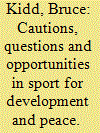| Srl | Item |
| 1 |
ID:
105413


|
|
|
| 2 |
ID:
152560


|
|
|
|
|
| Summary/Abstract |
Jeremy Corbyn's election and re-election as Labour leader, together with the emergence of a new Conservative Prime Minister committed to Brexit, has led to renewed speculation about the possibility of a new party appealing to the ‘politically homeless’ in the centre and centre-left of British politics. This article draws lessons from the SDP experience in the early 1980s. Are the structural conditions more favourable to the progressive centre-left now than they were then? Is there the sociological, electoral and ideological space for a new party? Does first past the post remain an insuperable barrier to an electoral breakthrough? From whom and in what circumstances might the leadership for a new party come? For all the depth of Labour's current problems, a new party seems an unlikely immediate prospect. In 1981, the SDP made a major miscalculation about the irreversibility of Labour's decline. However, the process of fragmentation in British politics seems set to continue.
|
|
|
|
|
|
|
|
|
|
|
|
|
|
|
|
| 3 |
ID:
105412


|
|
|
|
|
| Publication |
2011.
|
| Summary/Abstract |
In the increasing amount of published research and critical commentary on sport for development and Peace (sdp) two related trends are apparent. The first is a clear belief that, under certain circumstances, sport may make a useful contribution to work in international development and peace building; the second is that criticisms of it are frequently constructive, intended to support the work of practitioners in the field by outlining the limitations of what may be achieved through sport, and under what circumstances. Given these trends, public sociology provides a useful framing device for research and commentary and academics should now engage more directly with practitioners and provide more accessible summaries of their research to those engaged in sdp. We provide a brief introduction to public sociology, and outline its relevance in the sociology of sport, before making suggestions about the incorporation of public sociology into sdp research. Three main overlapping areas of research emerge from a public sociology perspective, and are needed in order to engage in a constructively critical analysis of sdp: descriptive research and evaluation; analyses of claims making; and critical analyses of social reproduction. The paper concludes with a brief examination of the dilemmas that may be encountered by those engaging in public sociology research, in both the academy and the field.
|
|
|
|
|
|
|
|
|
|
|
|
|
|
|
|
| 4 |
ID:
105402


|
|
|
|
|
| Publication |
2011.
|
| Summary/Abstract |
This paper examines the role and contribution of peacemaking to the wider sport, development and peace (sdp) sector. Particular attention is paid to a hitherto under-explored subject: the complex position of the military vis-à-vis sport and sport-related peacekeeping. Through an historical overview of the sport-military intersection, reference to fieldwork in Bosnia and Liberia, and a brief examination of the Conseil Internationale du Sport Militaire, some critical and cautious conclusions are put forth. We suggest that sport-based peacemaking interventions provide the military with a new kind of institutional function, and fresh ways of building positive social links to civilian populations. However, such engagement is only possible if full dialogical engagement between civilians and peacekeeping forces is established, in which the military adapt their practices to suit the local cultural context.
|
|
|
|
|
|
|
|
|
|
|
|
|
|
|
|